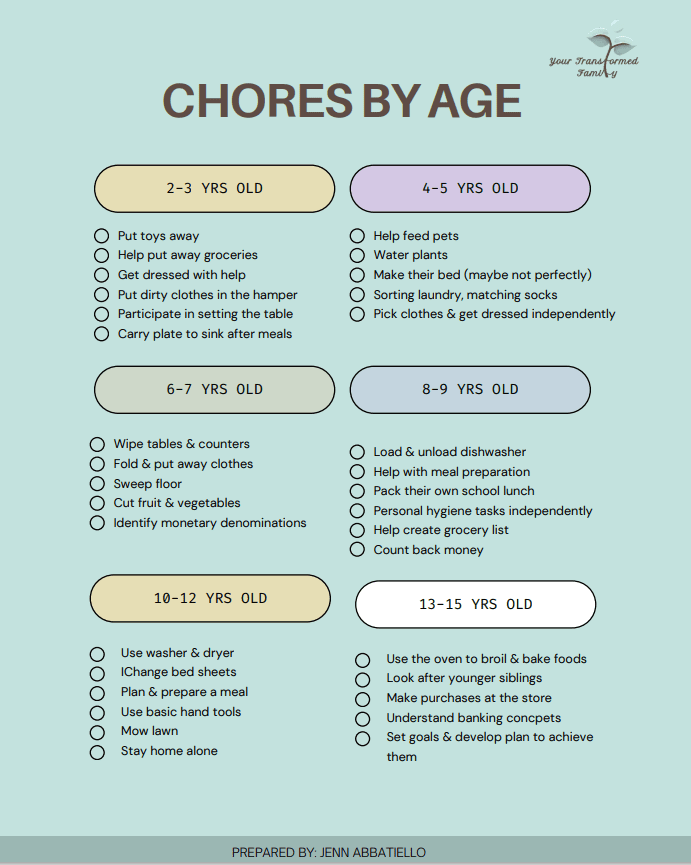Do you assume your housework must be done while your child is either busy, out of the house or sleeping? Or that “kids should be kids”, and it’s not their responsibility to do chores? Or perhaps the thought of how much longer it might take if you involve them feels too daunting. There are benefits to involving kids in household chores.
According to Pew Research, 62% of parents find parenting harder than they thought it would be combined with 44% of parents that are trying to parent differently than how they were parented. There are many reasons why parenting is harder than it’s ever been, but let’s focus on some things we can do to make our parenting easier…including our kids in household responsibilities is one of those ways.
What if getting your kids involved in household responsibilities not only helped you but was beneficial for them? Getting them involved from a young age helps establish habits and at that age kids are longing to be included and feel like they matter. They don’t distinguish play from ‘work’. Initially, things will take longer and may be messier but there are so many benefits to getting them involved that it is worth it. Would you be willing to try?
Benefits of Involving Kids in household chores
- Develops a sense of responsibility & independence
- Our role as parents is to raise confident and independent adults. When we involve them in household responsibilities, we are helping them build these skills incrementally. (Here are some other skills to teach your tweens and teens!)
- When kids are given responsibility, it also fills their need to matter and to belong. They feel part of the family when they can contribute, even in small ways. Notice their pride sore soar when they can do things for themselves. When they feel good on the inside, you are more likely to see positive behaviors and more willingness to cooperate. Think about yourself when you feel good about yourself.
- Builds work ethic
- Sure, sometimes we may not want to do chores, but developing this habit also fosters a healthy work ethic.
- Kids learn that even though some things aren’t as fun, we still need to get them done. You can look for ways to make the mundane chores fun – more to come on that.
- Fosters teamwork and collaboration
- They learn the value of working as a team and that we all can contribute. It isn’t just one person’s responsibility to do the housework.
- It is also an opportunity to talk about having to divide responsibilities which is a great skill to develop.
- Skill development
- Raising independent adults means learning how to cook, do laundry, take out the garbage, budgeting, etc….
- They learn organization, time management skills
- According to the American Academy of Child & Adolescent Psychiatry children who do chores may exhibit higher self-esteem, be more responsible, and be better equipped to deal with frustration, adversity, and delayed gratification. These skills can lead to greater success in school, work, and relationships.
- Family connection opportunity
- Instead of chores taking time away from your kids it can be time spent with them. your kids. Little ones will take such pride in helping and moody teenagers may decide to open up over a shared task.
If these benefits sound sounds appealing, let’s look at how to increase your likelihood of success in getting kids involved:
Tips for Successfully involving your kids:
Age-appropriate chores
-
- You want to give them tasks they are developmentally capable of doing and grow from there.
Make chores fun!- Let’s be honest:, chores may not always be exciting, especially as your kids get older, but you can find ways to make them fun.
- Examples: Incorporate a challenge: Let’s see how fast you can get dressed? Can you beat your time from yesterday? Music: when my boys and I fold laundry, we take turns playing our favorite songs.

Set clear expectations
- Using routine charts will help keep everyone on track so you don’t need to be nagging.
- Work together to make a list of things that need to get done. If they love stickers, give them stickers to they can put on the tasks they already completed.
- Using routines helps to set boundaries. Example: “when you finish your routines/responsibilities/chores then you can have screen time.” or “when you finish your routines/responsibilities/chores then you can leave for the park.”
- Structure, routines and clear expectations give kids predictability and a sense of control in their world, which in turn makes them feel safe
Lead by example
- Kids learn so much more from what we do than what we say
- Model the qualities you want your child to develop
- Reinforce chores are a shared responsibility by helping out
- You want to give them tasks they are developmentally capable of doing and grow from there.
Starting a new habit or routine isn’t easy. It starts hard and then gets easier. In the beginning, your kids will need you to be consistent with your expectations of them. It’s ok if you get off track, you always have an opportunity to get back on track.
Don’t forget to celebrate! It won’t go perfectly, praise the good.
Jenn Abbatiello is a mom, wife, cancer survivor, recovering perfectionist and dominant parent and a cycle breaker parent coach, Jenn is passionate about helping high-achieving moms and dads thrive and succeed in parenting. Jenn successfully juggled a demanding executive job as well as being a calm and connected parent with her kids, all while breaking generational patterns of emotional and physical abuse.
Jenn is the founder of Your Transformed Family, dedicated to helping parents feel calm, confident and connected in their families. With hundreds of family transformations, Jenn provides instantly-actionable strategies that make a real and lasting difference to families.



